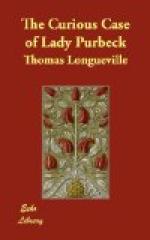“They,” i.e., Sir Robert Howard and Lady Purbeck, “grew to such boldness, that he brought her up to London and lodged her in Westminster. This was so near the Court and in so open view, that the King and the Lords took notice of it, as a thing full of Impudence, that they should so publickly adventure to outface the Justice of the Realm, in so fowl a business. And one day, as I came of course to wait on his Majesty, he took me aside, and told me of it, being then Archbishop of Canterbury; and added, that it was a great reproach to the Church and Nation; and that I neglected my Duty, in case I did not take order for it. I made answer, she was a Wife of a Peer of the Realm; and that without his leave I could not attach her; but that now I knew his Majesty’s pleasure, I would do my best to have her taken, and brought to Penance, according to the sentence against her. The next day I had the good hap to apprehend both her and Sir Robert; and by order of the High-Commission-Court, Imprisoned her in the Gate-House and him in the Fleet. This was (as far as I remember) upon a Wednesday; and the Sunday sevennight after, was thought upon to bring her to Penance. She was much troubled at it, and so was he.”
In the Strafford Papers[88] there is a letter to the Lord Deputy from Garrard, in which he says that, after Lady Purbeck’s sentence some years earlier, she had evaded it by flight and had “not been much looked after since;” but that “this winter she lodged herself on the Water side over against Lambeth, I fear too near the road of the Archbishop’s barge; whereof some complaint being made, she had the Sergeant at Arms sent with the warrant of the Lords and the Council to carry her to the Gate-House, whence she will hardly get out until she hath done her penance. The same night was a warrant sent signed by the Lords, to the Warden of the Fleet, to take Sir Robert Howard at Suffolk House, and to carry him to the Fleet; but there was never any proceeding against him, for he refused to take the oath ex-officio, and had the Parliament to back him out, but I fear he will not escape so now.”
It is open to those who may like to do so to take Laud’s words as meaning that Lady Purbeck and Sir Robert Howard were again living together in immorality. Possibly that may have been Laud’s meaning. If it was, he may have been mistaken. The world is seldom very charitable and, when Sir Robert and Lady Purbeck were both in London—which was comparatively a small place in those days—the gossips would naturally put the worst construction on the matter. If the very proper Charles I. heard such rumours, he would most likely believe them; so also would Laud.
From the meagre evidence existing on the question, there is much—the present writer thinks most—to be said in favour of the theory that the relations of Lady Purbeck to Sir Robert Howard were, at this time, perfectly innocent, and that they had been so ever since she had left him to live with her father, two years earlier. To begin with, is it likely that if, after so long a separation, the pair had wished to resume their illicit intercourse, they would have chosen London as the place in which to do so? Sir Robert may, or may not, have obtained for Lady Purbeck her lodging. If he did, there was not necessarily any harm in that.




